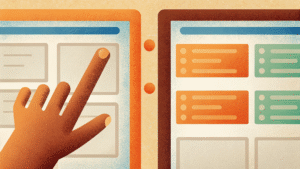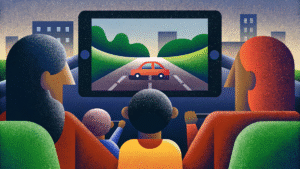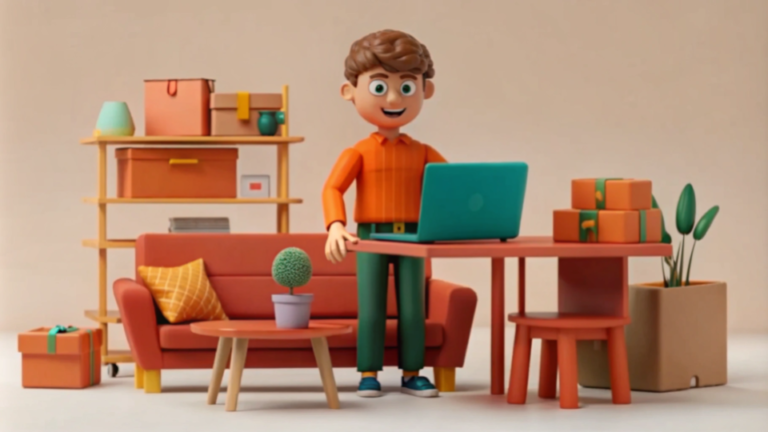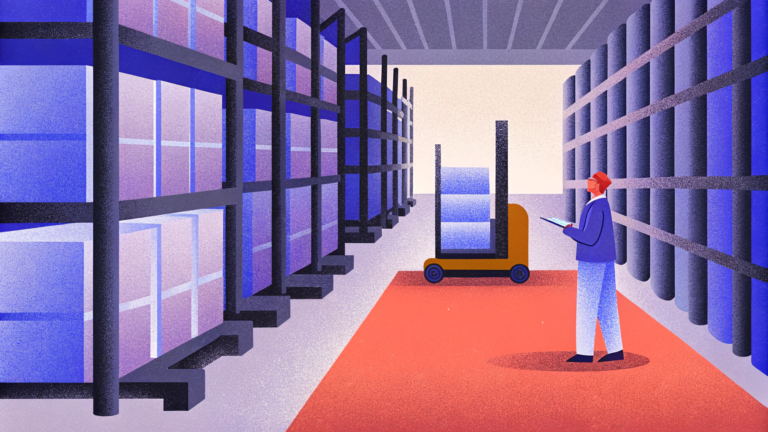Kreedo : Making Early Education A Playground of Possibilities
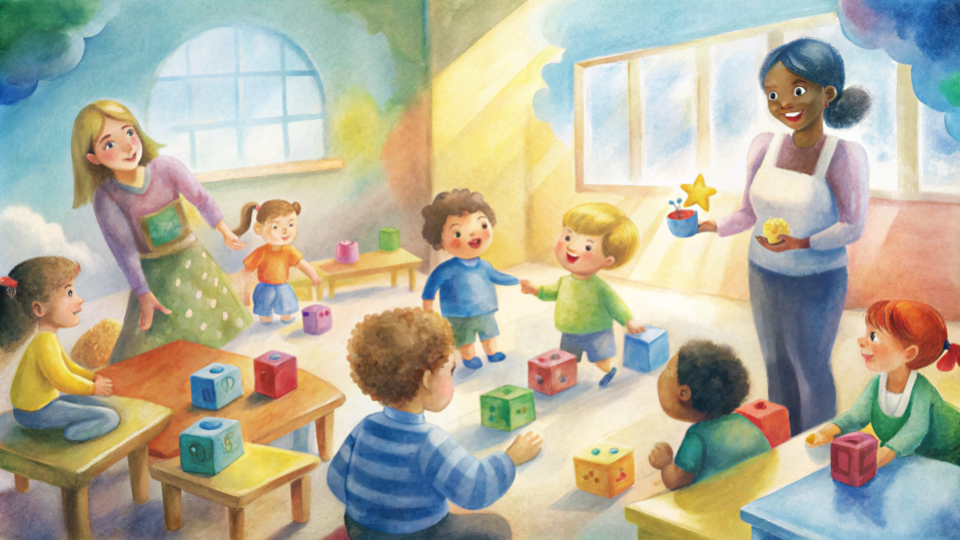
Kreedo is redefining early childhood education, making learning both exciting and impactful for kids in their foundational years. Founded in 2011 by husband-wife duo Mridula Shridhar and VK Manikandan in Bengaluru, Kreedo brings innovative, play-based learning to affordable private schools and preschools. Their vision? To empower schools with tools and methodologies that ensure children between the ages of 3 and 8 get a solid foundation for future learning. (Kreedo)
Kreedo operates with the goal of improving access to quality education, especially in underserved areas. With a unique 6T learning framework—incorporating Toys, Technology, Theory (books), Teacher training, Timetable, and Teamwork—they’ve designed an interactive, playful learning experience for young children. Their solutions focus on activity-based learning and practical classroom environments that foster creativity and critical thinking.
From its headquarters in Bengaluru, Kreedo has expanded rapidly, now serving over 3,500 schools and impacting more than 700,000 students. Their work is aligned with the guidelines of India’s National Education Policy (NEP) 2020, which emphasizes play-based learning in the foundational stage. With their innovative Kreedo Activity Labs and a strong commitment to teacher training, they are helping schools deliver high-quality education and improve learning outcomes across the country.
From Challenge to Chalkboard: Kreedo’s Founders Rewrite the Learning Rulebook
Mridula Shridhar and Manikandan Krishnan, the husband-wife duo behind Kreedo, founded the company in 2012 to democratize quality early childhood education in India. Both are alumni of the prestigious Indian Institute of Management, Calcutta (IIM-C), and bring years of experience in both education and technology to the table.
Mridula Shridhar
With a background in engineering from Bangalore Institute of Technology and a postgraduate diploma in management from the Indian Institute of Management, Calcutta, Shridhar’s career spans over two decades. Her career began as a systems engineer at Wipro Technologies and She has an extensive background in curriculum design. Her professional journey spans multiple roles, including co-founding Skola Toys, which offers educational toys designed to foster interactive learning. She also served as the Director of Kido Enterprises, where she spent over a decade focusing on child-centered learning approaches. (Mridula Shridhar)
Manikandan Krishnan
Manikandan Krishnan is an experienced entrepreneur with over 20 years in the fields of early childhood education, toy design, and manufacturing. In addition to his role at Kreedo, he is also a director at Kido Enterprises and a co-founder of Skola Toys Private Limited, both companies that reflect his passion for early learning and toy design.
Krishnan holds an MBA in Marketing from the Indian Institute of Management, Calcutta and a B.Tech in Aerospace from the Indian Institute of Technology, Bombay. Before founding these companies, he worked as a business analyst at Honeywell Technology Solutions, Inc., and as a consultant at Cambridge Technology Partners. (Manikandan Krishnan)
They realized that many affordable private schools and preschools lacked the resources to deliver quality early education. This realization was the foundation of Kreedo. Their solution? A unique 6T learning framework, which includes elements like Toys, Technology, Theory (books), Teacher training, Timetable, and Teamwork. This innovative model focuses on transforming classrooms into vibrant learning environments where play-based education is the norm.
The Global Playground: Why Early Learning Is Booming Worldwide
The global early childhood education market is booming, and for good reason—early education is key to setting children up for future success. In 2022, this market was valued at approximately USD 249.38 billion and is expected to grow to a staggering USD 467.83 billion by 2030, at a compound annual growth rate (CAGR) of around 8.21%. This massive growth is driven by increasing awareness among parents, governments, and educational institutions about the importance of early childhood education for children’s cognitive, social, and emotional development. (zionmarketresearch)
What’s fueling this boom?
Governments worldwide are pushing for quality early education through various initiatives. For example, India’s National Education Policy (NEP) 2020 emphasized early childhood care and education (ECCE), leading to new models of preschool education. Meanwhile, in the US, the Head Start and Early Head Start programs focus on preparing infants and toddlers for school, providing free educational services to children from low-income families.
The demand for digital tools in education is also on the rise. Many early education centers have adopted technologies like interactive learning platforms, augmented reality, and even virtual reality to engage young learners. These innovations not only enhance learning experiences but also make education more accessible, regardless of geographic location.
Challenges in the market
Despite the growth, there are significant challenges. Many low-income countries lack the infrastructure to provide quality early education. In addition, many parents in rural areas are still unaware of the long-term benefits of early education, which slows market growth in those regions. (Business Research Insights)
Overall, the global early childhood education market is on an upward trajectory, with the expansion of digital tools, government backing, and growing parental awareness driving its success. However, overcoming the infrastructure gap in underprivileged regions remains critical to ensuring that every child has access to quality education from an early age.
Playing to Win: Kreedo’s Mission, Vision, and The Big-Picture
Kreedo transforms the early learning landscape by making quality education accessible, especially for students from lower-income families attending budget private schools. They recognize that play-based and structured learning is crucial in the early years, and this insight has shaped their approach to education.
Mission and Vision
Kreedo’s vision is to create lasting social impact by bridging the gap in early childhood education quality. They aim to reach over one million children by 2025 through innovative learning environments that cater specifically to students aged 3 to 8. Their model is based on transforming not just individual classrooms but entire school ecosystems to prioritize foundational learning. (About Kreedo)
Problems They Solve
India has a significant number of budget private schools, many of which still rely on outdated rote-learning methods due to resource constraints. Kreedo addresses this gap by introducing a dynamic, play-based curriculum through its proprietary 6T Learning Framework. This model includes elements such as Toys, Technology, Theory (books), Teacher Training, Timetable, and Teamwork, creating a well-rounded, interactive learning experience that fosters engagement and better learning outcomes. By setting up Kreedo Activity Labs within schools, they provide access to a structured curriculum that supports both educators and students.
Business Model
Kreedo operates on a non-franchise, partner-based model where they collaborate directly with schools. For an initial setup fee, Kreedo provides partner schools with a Kreedo Lab equipped with 150 teaching materials, along with curriculum support, training, and resources through a per-student subscription. This model makes it affordable for schools while ensuring a steady revenue stream. Additionally, Kreedo’s Curriculum app, available on Android and iOS, offers lesson plans, timetables, and assessments to further aid teachers in tracking and enhancing student progress.
Building Blocks of Brilliance: Kreedo’s Products and Programs
Kreedo’s educational toolkit transforms early learning with its innovative and play-based approach. Their products focus on creating interactive, activity-rich environments for children aged 2 to 8, using Kreedo Labs, learning materials, and apps that make foundational learning both fun and effective.
Kreedo Labs and Learning Materials
Kreedo sets up dedicated Kreedo Labs in partner schools, filled with over 150 educational materials designed to teach through play and hands-on activities. The lab emphasizes their unique “6T Learning Framework,” which includes Toys, Theory (books), Technology, Teacher Training, Timetable, and Teamwork. This setup fosters experiential learning, allowing children to understand concepts through play and peer interaction before abstracting the knowledge in a classroom setting. The labs are structured to promote literacy, numeracy, cognitive skills, and socio-emotional development.
Kreedo’s Practivity Boxes and Home Learning Kits
To address learning needs at home, Kreedo developed Practivity Boxes. These kits contain activities and materials that align with their school curriculum, enabling continuity in learning outside the classroom. Especially popular during the pandemic, Practivity Boxes ensure that young learners can keep up with their education, even if traditional schooling is interrupted.
Kreedo Curriculum App
The Kreedo Curriculum App, available on both Android and iOS, provides digital lesson plans, activity timetables, and skill-based assessments for teachers. It helps educators track each child’s progress, simplifying classroom management and lesson delivery. For parents, the app fosters engagement, allowing them to follow their child’s learning journey and support development at home. (Kreedo Curriculum App)
Teacher Training and Support
A key feature of Kreedo’s offering is its extensive teacher training program, which equips educators to deliver their play-based curriculum effectively. Kreedo emphasizes a “practical to theory” approach, where teachers guide children from hands-on activities to abstract learning concepts. This method, combined with continuous assessments and Kreedo’s support resources, aims to improve teaching quality and learning outcomes. (Teacher Training)
Branding and Marketing Assistance
Unlike franchise models, Kreedo enables schools to operate independently while providing branding and marketing support. By promoting schools as “powered by Kreedo,” they help build reputation without charging franchise or royalty fees. This approach not only attracts enrollments but also allows schools to sustain higher educational standards.
These comprehensive tools and services position Kreedo as a versatile solution for early childhood education, aligning with India’s National Education Policy (NEP) and meeting the developmental needs of young learners. (Kreedo Schools)
Counting Success : How Kreedo’s Impact Is Reshaping Classrooms
Kreedo has made a significant impact on early childhood education in India. Through their play-based 6T Learning Framework, they’ve reached over 3,500 schools and preschools across multiple regions in India, impacting more than 700,000 children. They have partnered with over 400 budget private schools and more than 1,500 preschools. Their achievements have been highlighted in major outlets like CNBC TV, Entrepreneur India, and Inc42, underscoring their role as a leader in revolutionizing early childhood education. Kreedo has rapidly grown its presence and financial backing in the edtech sector. As of August 2024, the company has raised a total of $6.3 million across two funding rounds. (Tracxn)
Series A Funding – August 27, 2024
In August 2024, Kreedo secured $4 million in Series A funding to scale its offerings and expand into new regions across India. This round was led by Heritas Capital Management, Gray Matters Capital, and The Chennai Angels. The corporate investment team included UBS, 1Crowd, and Jokaangelnetwork, with Regis and Savoy Capital and Zanskar Advisors facilitating the round. This funding aims to support Kreedo’s ambitious target to impact one million children annually by 2025.
Seed Funding – July 4, 2022
Kreedo’s growth gained momentum with a $2.3 million seed round in 2022. Institutional investors UBS, Spectrum Impact, Gray Matters Capital, Innospark, and The Chennai Angels joined this round, alongside corporate investors 1Crowd and IIM.
Revenue
Kreedo has seen impressive revenue growth over recent years, driven by its expanding partnerships and educational reach. In FY 2022-23, Kreedo reported a revenue of $3.8 million, more than doubling from $1.8 million in FY 2021-22. Their revenue trajectory has seen fluctuations, notably in FY 2019-20 when revenue peaked at $2.8 million before dipping slightly in the subsequent years due to challenges faced by the broader edtech sector. For instance, FY 2020-21 recorded a lower revenue of $1.1 million, reflecting the pandemic’s impact on the education sector and in-person learning
Not Just Child’s Play: Kreedo’s Call to Innovate Education
Kreedo is transforming early childhood education by focusing on affordability, scalability, and impact. With their innovative 6T Learning Framework, they are reshaping learning environments to make foundational education engaging and effective for young learners. Their emphasis on play-based, interactive learning not only aligns with India’s National Education Policy (NEP) 2020 but also fulfills a crucial need in budget private schools, where resources are often limited.
As Kreedo looks ahead, their goals remain clear: to bridge education gaps, provide impactful learning tools, and enable low-income communities to access high-quality foundational education. Their collaborative, non-franchise model and commitment to social impact underscore their vision of democratizing early education across India. Kreedo’s journey illustrates how thoughtful innovation in education can create lasting change, transforming not only classrooms but entire communities.
For educators, investors, and parents alike, Kreedo’s story is a reminder of the power of well-implemented ideas in making a difference. If you’re passionate about education or have an idea to explore, let Kreedo inspire you to start building! And for more stories on innovative ventures, don’t miss out on other profiles on Venture Kites.
At a Glance with DORK Company
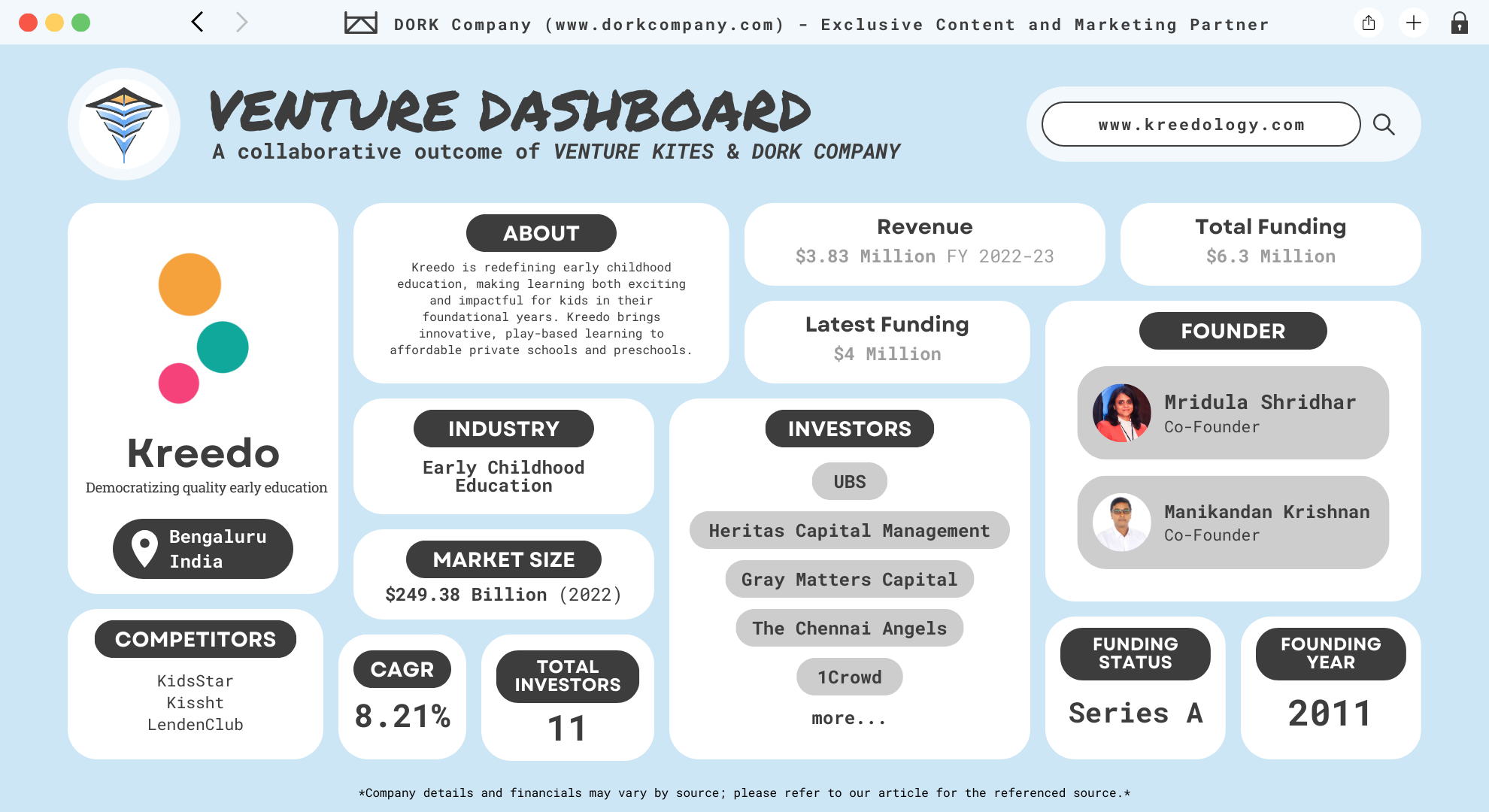
Dive In with Venture Kites
Lessons From Kreedo
Prioritize Mission Alignment
The Lesson & Why it Matters: A clearly defined mission keeps all actions focused and cohesive, especially in growth phases. It helps align the team and resonates with customers.
Implementation: Startups should anchor their brand with a core mission, ensuring every decision supports it.
Kreedo’s Example: Kreedo’s mission to democratize quality education is central to all its operations, guiding partnerships, product development, and expansion.
Embrace Flexibility in Business Models
The Lesson & Why it Matters: A flexible model allows adaptation to market needs and changes in demand.
Implementation: Consider hybrid or modular models that allow customers to adopt solutions that suit their unique needs.
Kreedo’s Example: Kreedo operates on a non-franchise model, letting schools maintain independence while benefiting from Kreedo’s curriculum and support
Build Solutions for Long-Term Social Impact
The Lesson & Why it Matters: Solutions with social impact create brand value and can attract mission-driven investors.
Implementation: Design products or services that address a clear social or environmental need in addition to business goals.
Kreedo’s Example: By focusing on affordable quality education, Kreedo attracts investors interested in impact-driven growth
Optimize for Cultural Relevance
The Lesson & Why it Matters: Products that resonate culturally increase user engagement and satisfaction.
Implementation: Tailor solutions to local preferences, languages, and practices, especially when scaling internationally.
Kreedo’s Example: Kreedo adapts its curriculum to reflect local cultures and festivals, making learning meaningful for students across regions
Leverage Low-Cost, High-Impact Solutions
The Lesson & Why it Matters: Budget-friendly innovation can provide a competitive edge and improve accessibility for a wider audience.
Implementation: Focus on impactful solutions that are easy to scale and require minimal resources.
Kreedo’s Example: Kreedo’s low-tech resources and modular learning kits make education accessible even in underfunded schools
Youtube Shorts
Author Details
Creative Head – Mrs. Shemi K Kandoth
Content By Dork Company
Art By Dork Company
Instagram Feed
X (Twitter) Feed
🚀 @kreedosolutions is changing the game in early childhood education with a focus on play-based learning! 🎒🌍
— Venture Kites (@VentureKites) November 7, 2024
Let’s explore how they’re making quality early education accessible and impactful 👇👇#EdTech #EarlyChildhood #Kreedo



